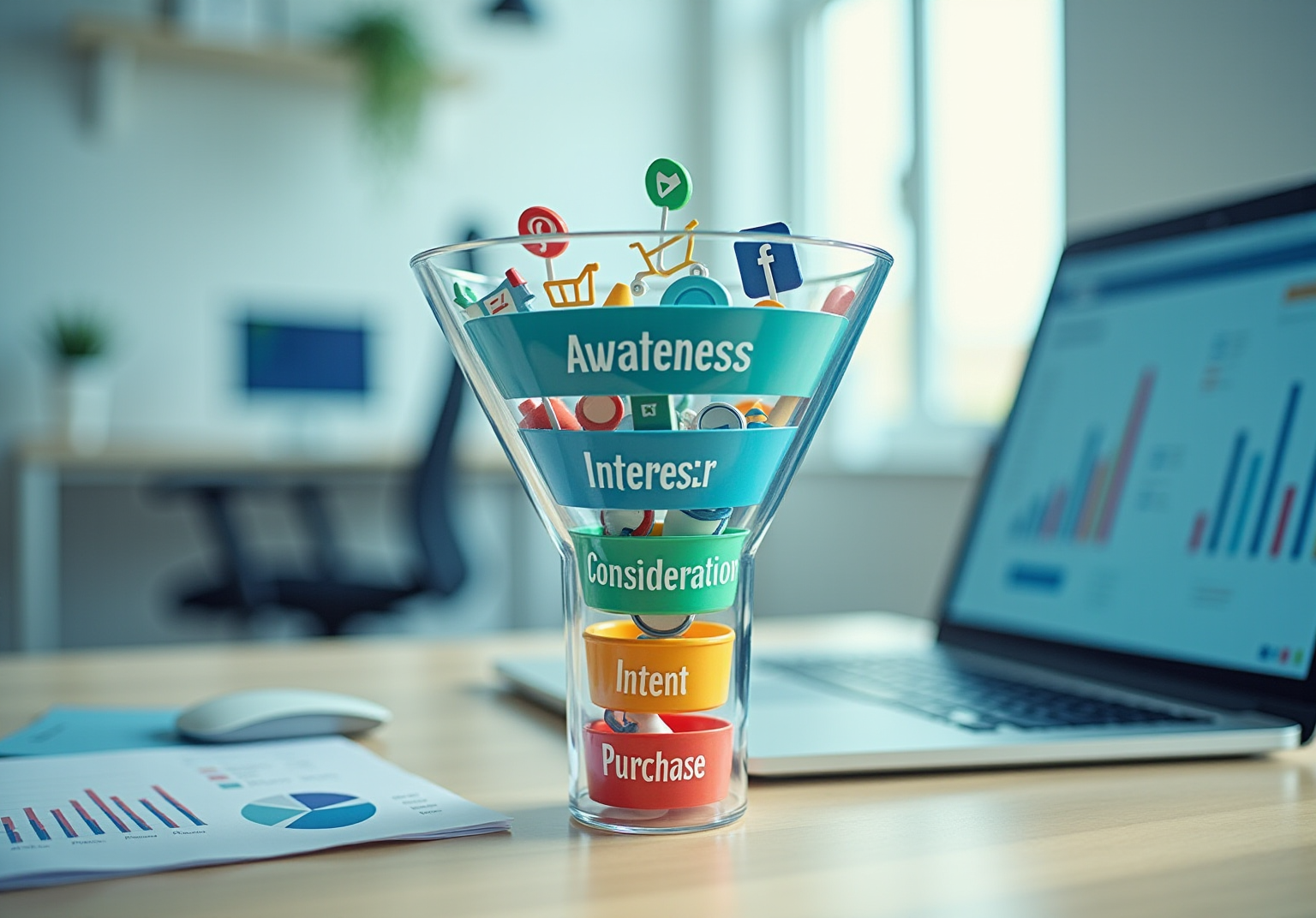
Overview
This article provides an authoritative examination of the marketing funnel stages specifically for direct-to-consumer (DTC) brands. These stages encompass:
- Awareness
- Interest
- Consideration
- Intent
- Evaluation
- Purchase
- Loyalty
Mastering each stage with tailored strategies is essential, as it significantly enhances customer engagement and drives conversions. Successful DTC companies exemplify this by employing targeted marketing tactics that effectively guide potential clients from initial awareness to becoming loyal advocates. By understanding and implementing these strategies, brands can optimize their marketing efforts and foster lasting customer relationships.
Introduction
Understanding the intricacies of the marketing funnel is essential for direct-to-consumer (DTC) brands striving to optimize their customer engagement strategies. This framework not only maps the journey from initial awareness to loyal advocacy but also highlights the critical touchpoints that influence consumer behavior. As brands navigate this complex landscape, they face the pressing challenge of effectively connecting with potential clients at each stage.
How can they ensure that their marketing strategies resonate and drive conversions amidst increasing competition? The answer lies in a strategic approach that addresses each phase of the funnel with precision and insight.
Define the Marketing Funnel: An Overview
The stages of the marketing funnel are a crucial framework that outlines the journey prospective clients embark on, from initial brand awareness to making a purchase and evolving into loyal advocates. This funnel typically encompasses several stages of the marketing funnel:
- Awareness
- Interest
- Consideration
- Intent
- Evaluation
- Purchase
Each phase in the stages of marketing funnel signifies a distinct step in the client journey, designed to guide prospects toward conversion and drive sales.
Understanding the is vital for direct-to-consumer (DTC) companies, as it enables them to tailor their marketing strategies to effectively engage clients at every stage. For instance, during the awareness phase, companies can leverage digital marketing tactics such as social media advertising and SEO to enhance visibility and attract potential clients. As individuals transition to the interest phase, compelling content and personalized interactions can ignite their curiosity and encourage deeper exploration of the brand.
Successful DTC companies adeptly navigate the stages of the marketing funnel by implementing targeted strategies at each stage. For example, offering complimentary samples can sway hesitant clients during the evaluation phase, while clear calls to action and enticing offers can facilitate conversions in the action phase. By optimizing each level of the stages of marketing funnel, companies not only elevate immediate sales but also foster enduring loyalty among their clientele.
Parah Group distinguishes itself from other CRO agencies by prioritizing profitability and sustainable growth, focusing on data-driven decisions that enhance the client experience. Upon initiating a partnership, clients undergo a customized onboarding process that lays the groundwork for long-term success. This approach ensures that every stage of the marketing funnel is refined for maximum impact, ultimately transforming prospects into devoted customers and advocates for the brand.
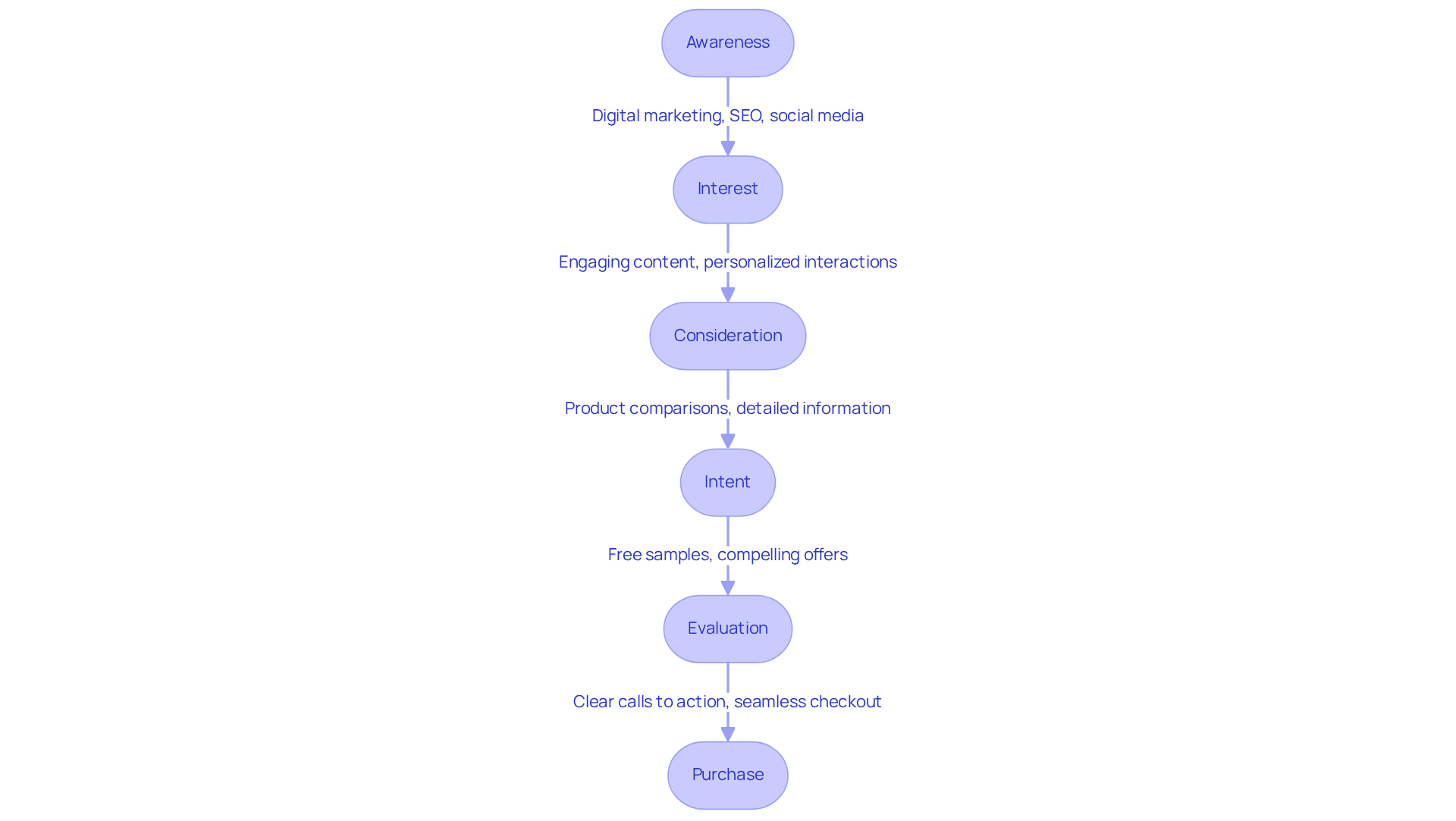
Explore the Stages of the Marketing Funnel: From Awareness to Loyalty
The marketing funnel comprises several pivotal stages that guide potential customers from initial awareness to brand loyalty:
- Awareness: This initial stage is crucial for capturing the attention of potential customers. Effective strategies include leveraging social media advertising, forming partnerships with influencers, and utilizing content marketing to create engaging narratives that resonate with the target audience. For instance, a $30M apparel company collaborated with Parah Group to revamp their homepage, emphasizing social proof and reviews, which significantly increased their visibility.
- Interest: Once potential clients are aware of a brand, they begin to show interest in its offerings. This phase can be developed through , personalized email marketing, and targeted ads that highlight product benefits and unique selling propositions. Parah Group's strategies, such as gamifying the progress bar for free shipping thresholds, have proven effective in maintaining buyer interest.
- Consideration: At this stage, clients assess the company in comparison to rivals. Offering comprehensive product details, highlighting client reviews, and presenting comparison guides can greatly impact their decision-making process. For example, a cleaning product brand saw an 80% increase in average order value (AOV) after implementing bundles and multi-packs, showcasing the importance of value propositions during consideration.
- Intent: Customers demonstrate intent to purchase, often by adding items to their cart. Brands can encourage this behavior through retargeting ads, limited-time offers, and reminders that create a sense of urgency. Parah Group's introduction of free gifts over a certain cart size has effectively driven intent among shoppers.
- Evaluation: Here, customers weigh their options before making a final decision. Offering incentives such as free shipping, discounts, or exclusive deals can effectively help close the sale. The case studies show that companies conducting price testing and highlighting larger item value propositions have experienced substantial enhancements in conversion rates.
- Purchase: This is the final stage where the transaction occurs. A seamless and user-friendly checkout process is essential to ensure conversion and minimize cart abandonment. Parah Group emphasizes optimizing the checkout experience, which has led to a 35% increase in conversion rates for their clients.
- Loyalty: After purchase, companies should concentrate on keeping clients through loyalty initiatives, personalized communication, and outstanding service. These efforts promote repeat purchases and cultivate advocacy for the company, ultimately increasing lifetime value for clients. By executing continuous CRO initiatives, companies can consistently enhance their strategies to preserve client loyalty.
By comprehending and enhancing each of the stages of the marketing funnel, DTC companies can effectively connect with their audience, drive conversions, and establish enduring relationships, as demonstrated by the transformative outcomes achieved through Parah Group's innovative CRO strategies.
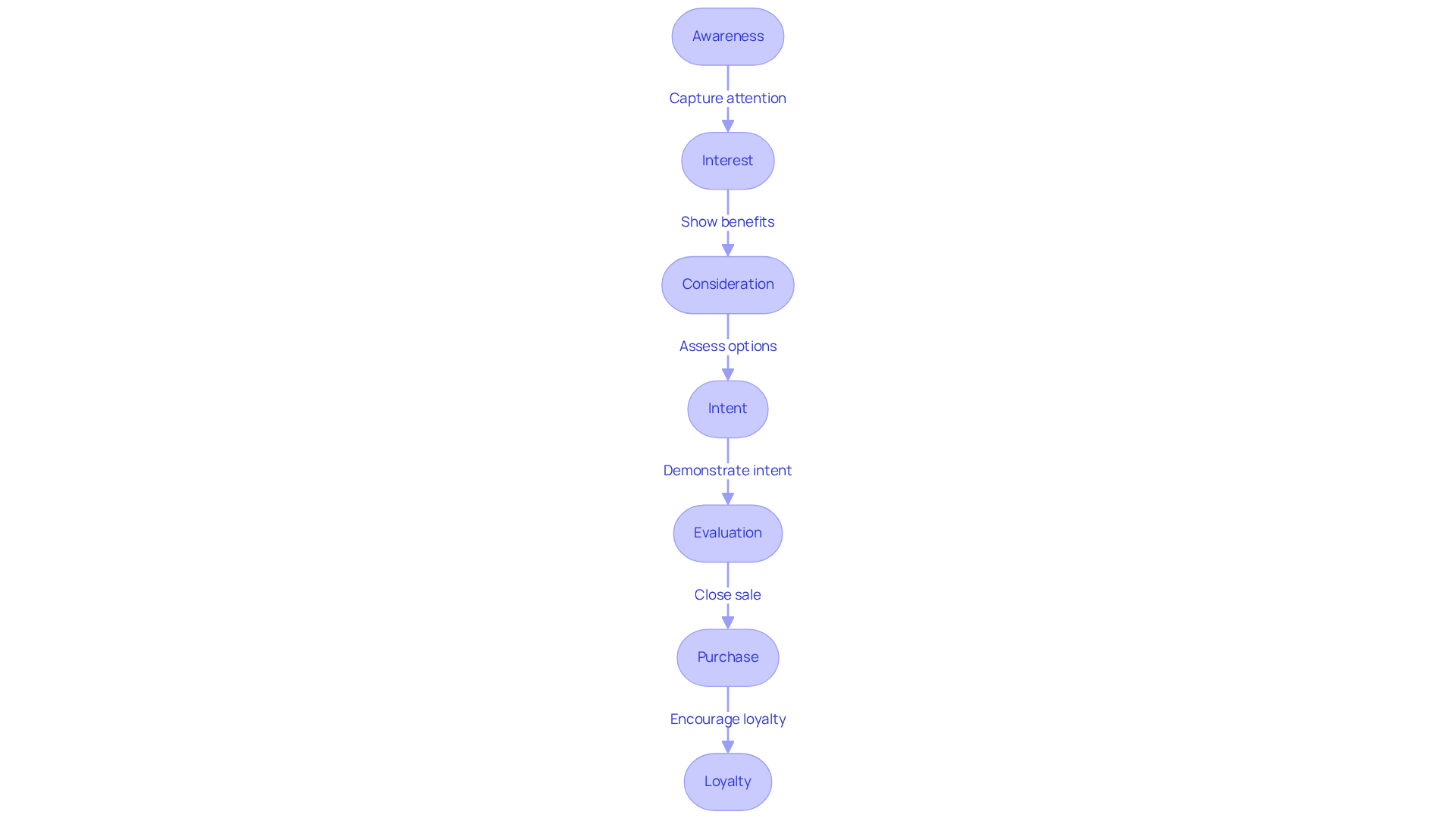
Understand the Importance of Each Stage for DTC Brands
Each stage of the marketing funnel plays a critical role in the success of DTC brands:
- Awareness: Building brand awareness is essential for attracting new customers. Without awareness, potential clients may never enter the funnel. Companies that effectively utilize social media and storytelling can significantly enhance visibility; indeed, 90% of social media users follow at least one company.
- Interest: Generating interest is crucial for keeping potential clients engaged throughout the stages of the marketing funnel. Brands that fail to capture interest risk losing prospects to competitors. Engaging content, such as videos and interactive elements, can double consumer engagement, as demonstrated by Petite Plume's campaign, which significantly increased engagement on Instagram Reels.
The contemplation phase is one of the stages of the marketing funnel where companies can distinguish themselves. Delivering valuable content and tackling consumer pain points can greatly impact purchasing choices. Significantly, 81% of consumers require confidence in a company before making a purchase, emphasizing the necessity of establishing trust during this phase.
- Intent: Understanding consumer intent allows brands to tailor their messaging and offers at various stages of the marketing funnel, thereby increasing the likelihood of conversion. Tailoring communication according to client behavior can significantly boost engagement and increase sales.
- Evaluation: This stage of the stages of marketing funnel is pivotal for overcoming objections. Brands that effectively convey value and address concerns can convert hesitant clients. For instance, brands that highlight trust signals, such as secure payment options and clear return policies, can alleviate buyer anxiety.
- Purchase: A smooth purchasing experience is vital for conversion rates in the stages of marketing funnel. Various payment methods and quick, dependable shipping are essential for guaranteeing a , improving satisfaction and boosting the chances of finalizing a sale.
- Loyalty: Keeping clients is frequently more economical than gaining new ones, especially when considering the stages of the marketing funnel. Brands that prioritize loyalty can benefit from repeat purchases and positive word-of-mouth, which are invaluable for long-term success. Implementing loyalty programs and follow-up communications can significantly enhance customer retention rates.
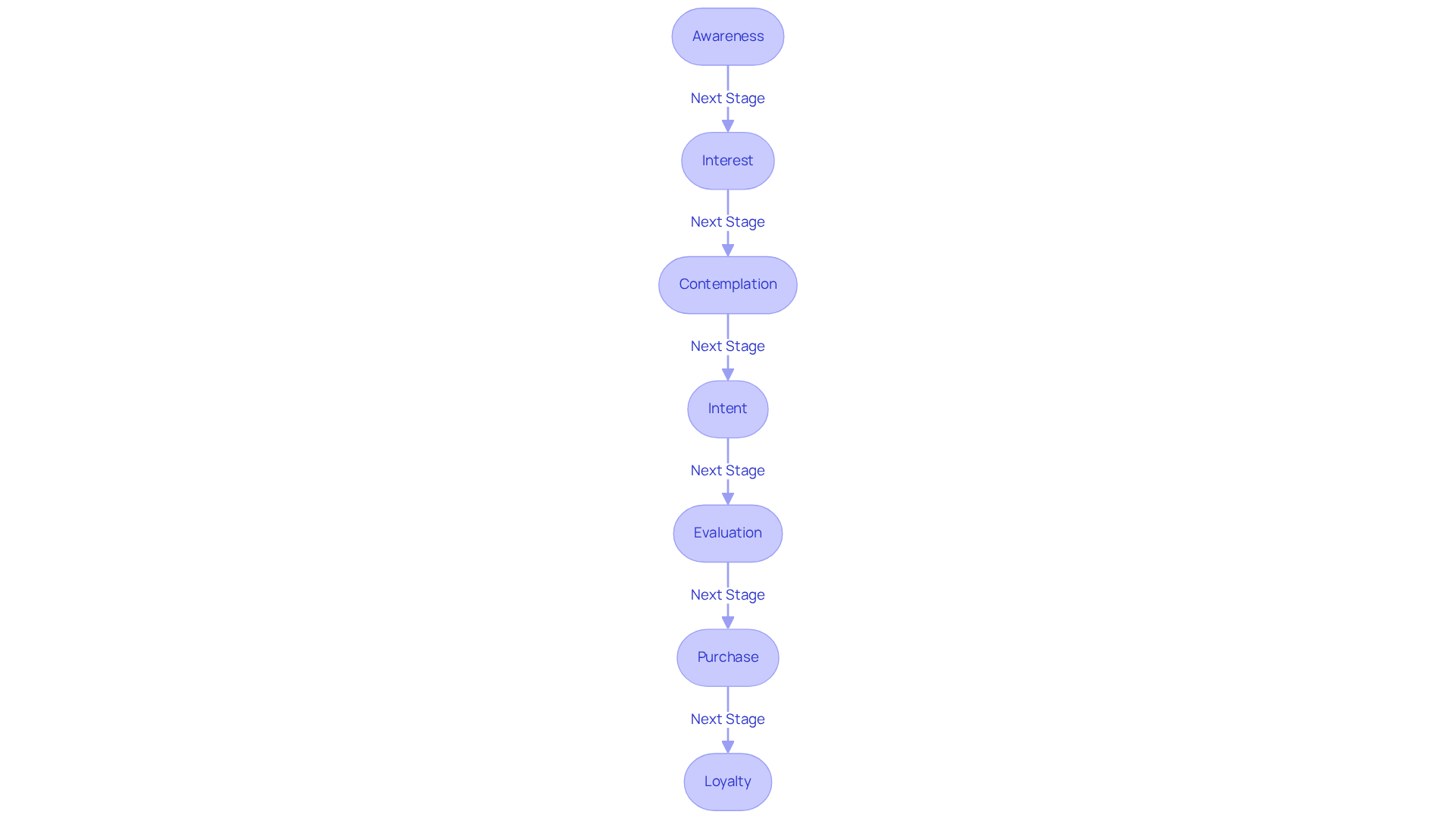
Challenges in Navigating the Marketing Funnel for DTC Brands
DTC brands frequently encounter significant challenges while navigating the stages of the marketing funnel.
- High Customer Acquisition Costs (CAC): The surge in competition has resulted in a staggering 222% increase in CAC from 2013 to 2022. To combat these escalating expenses, companies must refine their promotional strategies, focusing on such as influencer collaborations and community engagement to maintain efficiency without incurring excessive costs.
- Fragmented Customer Journeys: Customers often interact with brands through various channels, complicating the tracking of their journeys. By implementing integrated marketing strategies, companies can create a seamless experience that enables them to better understand and respond to client needs.
- Retention vs. Acquisition: Achieving a balance between acquiring new clients and retaining existing ones is essential for sustainable growth. Brands should develop comprehensive strategies that address both dimensions, as a mere 5% increase in client retention rates can lead to profit enhancements of 25% to 95%.
- Data Overload: The sheer volume of available data can overwhelm organizations, making it difficult to derive actionable insights. By effectively leveraging analytics tools, companies can make informed decisions based on consumer behavior, thereby enhancing their marketing initiatives.
- Changing Consumer Preferences: As consumer preferences continue to evolve, companies must remain agile and adapt their strategies accordingly. Ongoing market research and proactive customer feedback mechanisms are vital for maintaining relevance in a rapidly shifting landscape.
By addressing these challenges with innovative and integrated approaches, DTC brands can navigate the complexities of the stages of the marketing funnel more effectively, ultimately driving growth and profitability.
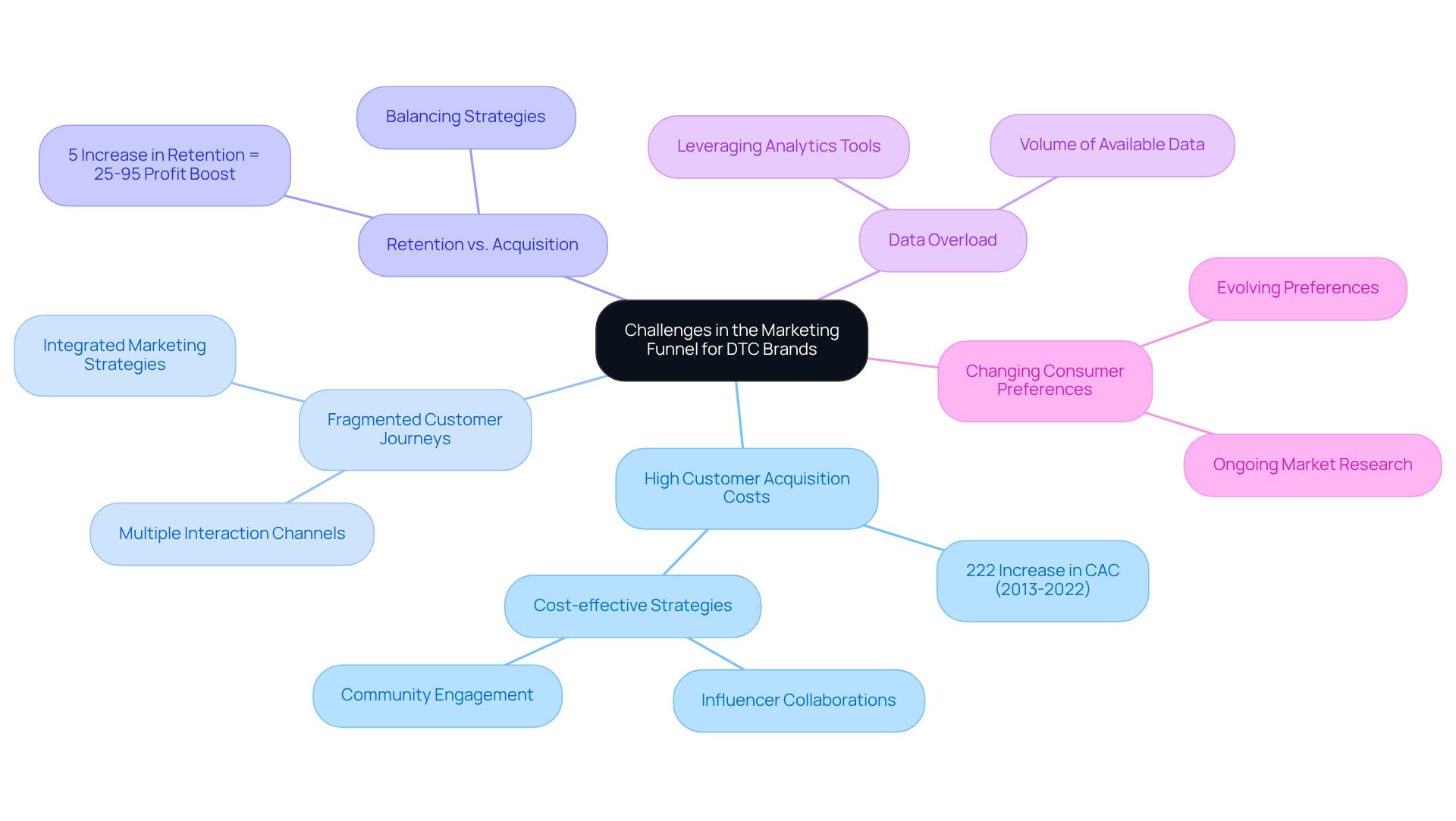
Conclusion
Understanding the stages of the marketing funnel is essential for direct-to-consumer (DTC) brands aiming to effectively engage their audience and drive sales. Recognizing that each phase—from awareness to loyalty—represents a unique step in the customer journey allows brands to tailor their marketing strategies to meet the needs of potential clients at every turn. This structured approach not only enhances conversion rates but also fosters long-term customer loyalty.
Key insights throughout the article highlight the importance of each stage within the marketing funnel. Leveraging social media for awareness, creating engaging content to spark interest, and offering incentives during evaluation are crucial strategies for guiding prospects toward a purchase. Furthermore, the emphasis on optimizing the purchasing experience and nurturing loyalty underscores the necessity for DTC brands to remain attentive to customer preferences and behaviors. Successful case studies demonstrate that implementing targeted strategies at each stage can lead to significant improvements in customer engagement and satisfaction.
Ultimately, DTC brands must recognize that navigating the marketing funnel is not merely about driving sales; it's about building lasting relationships with customers. By prioritizing each stage of the funnel and addressing the challenges that arise, brands can create a seamless and rewarding customer experience. This approach will enhance immediate profitability and ensure sustainable growth in an increasingly competitive market. Embracing the marketing funnel as a dynamic framework empowers DTC brands to thrive and adapt to ever-changing consumer demands.
Frequently Asked Questions
What is the marketing funnel?
The marketing funnel is a framework that outlines the journey prospective clients take from initial brand awareness to making a purchase and becoming loyal advocates.
What are the stages of the marketing funnel?
The stages of the marketing funnel include Awareness, Interest, Consideration, Intent, Evaluation, and Purchase.
Why is understanding the marketing funnel important for DTC companies?
Understanding the marketing funnel is vital for direct-to-consumer (DTC) companies as it helps them tailor their marketing strategies to effectively engage clients at every stage of their journey.
How can companies enhance visibility during the awareness phase?
Companies can enhance visibility during the awareness phase by leveraging digital marketing tactics such as social media advertising and SEO.
What strategies can be used to engage clients in the interest phase?
In the interest phase, companies can use compelling content and personalized interactions to ignite curiosity and encourage deeper exploration of the brand.
How can companies sway hesitant clients during the evaluation phase?
Offering complimentary samples can sway hesitant clients during the evaluation phase.
What tactics can facilitate conversions in the action phase?
Clear calls to action and enticing offers can facilitate conversions in the action phase.
How does Parah Group differentiate itself from other CRO agencies?
Parah Group prioritizes profitability and sustainable growth by focusing on data-driven decisions that enhance the client experience.
What is the onboarding process like with Parah Group?
Upon initiating a partnership, clients undergo a customized onboarding process that lays the groundwork for long-term success, ensuring that every stage of the marketing funnel is refined for maximum impact.
FAQs











